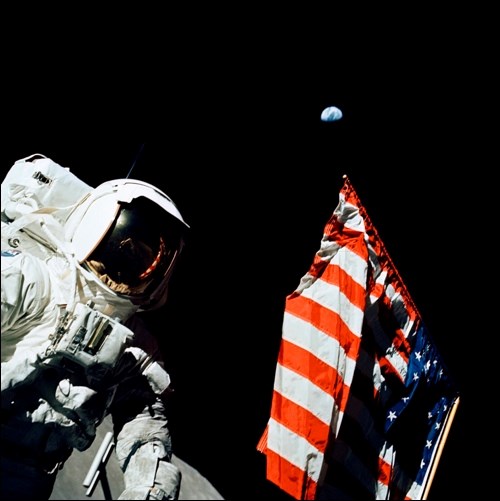The documentary Mission Control: The Unsung Heroes of Apollo, is now available in theatres and on demand. That’s what a Facebook ad told me as I sat down to type this column.
That’s quite interesting, since earlier in the day as I folded clothes, I listened to the audio book of A Man on the Moon: The Voyages of the Apollo Astronauts, by Andrew Chaikin. I’m still early in the book, and just got through the part where Apollo 8 made mankind’s first venture to lunar orbit.
This book comes on the heels of Failure Is Not an Option, by Gene Kranz. Kranz was a key member of mission control in the early days of space exploration. In the movie Apollo 13, he’s played by Ed Harris. He’s one of the key players featured in Mission Control. It’s hard not to notice that the people in that documentary are, well, very old.
And as I crawled out of bed this holiday weekend, my son was watching The Martian, the recent sci-fi flick about an astronaut played by Matt Damon being accidentally left on Mars for over a year before being rescued.
Through all of this, I kept thinking to myself that man last set foot on the moon before I was born, and who knows if I will live long enough to see it happen again? All my life, experts have said we were 30 years from visiting Mars. Well over 30 years later, we’re still likely 30 years away.
In 2011, at the Williston Basin Conference in Regina, I had the privilege of talking to and shaking the hand of Dr. Harrison Schmitt, the only geologist to walk on the moon, and one of only 12 men to do the same. Schmitt was part of Apollo 17, the last manned mission to the moon, and technically the second last man to walk on it. That’s semantics, really, since it’s just the order of who scaled the ladder last to get into the lunar module.
As a geology conference, attracting him was quite a score. For me, meeting Schmitt was on par with meeting Donald Trump. Maybe higher, upon reflection. Trump didn’t walk on the moon.
But along the lines of Kranz being old, the astronauts he helped get to the moon are also old. And of the 12 who actually landed, half are now dead.
One of the things that keeps being mentioned in the books I’ve been listening to was President John F. Kennedy’s 1961 invocation to reach the moon before the end of the decade, not because it was easy, because it was hard. His words were inspirational to, well, everyone, it seems. But once that was accomplished, it seems like things just went downhill, especially the impetus to actually get it done.
The space shuttle program has come and gone, and all the remaining shuttles are now museum pieces.
The new Orion spacecraft, meant to bring Americans (and hopefully a few Canadians) back into space, looks an awful lot like Apollo, except that it’s over 40 years late. On May 12, NASA announced it intends to launch the Orion in Exploration Mission-1 (EM-1), but will be doing so without a crew. Oh, and it now won’t happen until 2019. The last flight of the space shuttle took place in 2011, but, hey, there’s no rush here.
Elon Musk keeps trying to land rockets for their eventual re-use. Various ventures are trying to commercialize space travel. Musk wants to send people to Mars, eventually. Given how slow NASA have become, let’s hope Musk leaves them in the dust.
Here’s what I don’t get – why is this so hard? Compared to what it took to get the Apollo program together, when every mission had to figure out some set of unknowns, we’ve been going to space for a long time now. Most of the unknowns are now known.
There’s more computing power in my office than in all of NASA in the 1960s. It’s common to have CNC machining capabilities now in most machine shops. There is so much we can do now that is far beyond what was “space age” back then. So why don’t we just do it?
The Space Launch System, which carries the Orion, is NASA’s project to get back in the game. Canada’s training its newest class of astronauts. Whether any of them will actually fly or not is another story.
I’m not holding my breath.
Brian Zinchuk is editor of Pipeline News. He can be reached at [email protected].




